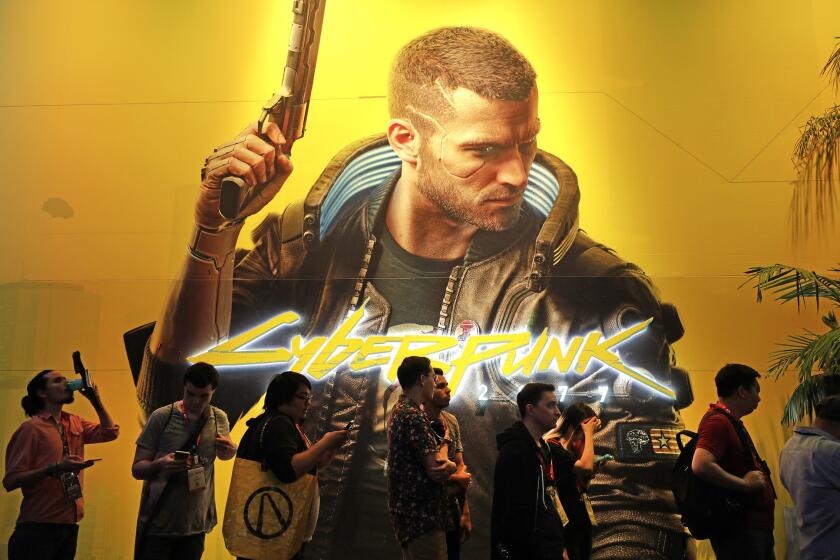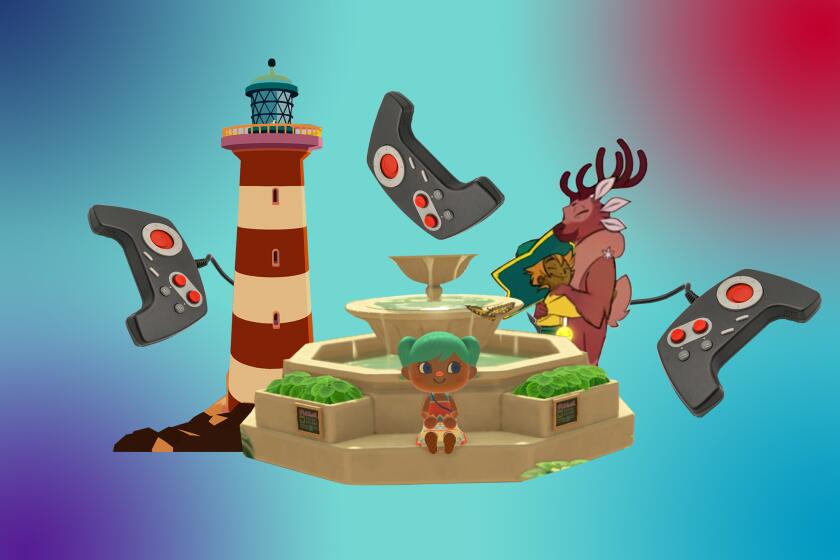The Game Awards drew more than 83 million livestreams. Why that matters
- Share via
The Game Awards may not have the perceived cultural cachet of the Academy Awards, but the online telecast certainly has Hollywood power — “Wonder Woman” star Gal Gadot, Keanu Reeves and “Tenet” director Christopher Nolan, as well as the film’s star, John David Washington, presented key awards this year — for a powerful viewing base that’s only continuing to grow.
The 2020 telecast, staged this month from a Hollywood soundstage as well as dozens of remote locations, pulled in more than 83 million livestreams, falling just a bit shy of doubling last year’s 45.2 million livestreams, which was itself a sharp increase from the 11.5 million the ceremony garnered in 2017.
Although not a direct comparison to the online audience of the Game Awards, consider that the Academy Awards in February drew just 23.6 million broadcast viewers on ABC, an all-time low for the telecast, which 10 years ago had 42 million viewers.
Game Awards creator Geoff Keighley is already thinking ahead to future installments and how the telecast can better represent the industry. The show was hosted across numerous online platforms, including Twitch and YouTube in the U.S., and a firm number of peak concurrent viewers is difficult to gauge, because many streamers have different reporting procedures. But on Twitch alone, the Game Awards tallied 2.63 million simultaneous viewers. Globally, the Game Awards are found on more than 40 online networks.
The awards, which are voted upon by members of the media, including this outlet, also gives fans a say in the outcome. An estimated 18.3 million fans are said to have voted on the winners, which were led this year by “The Last of Us Part II,” which collected seven awards — including the game of the year prize over “Ghost of Tsushima,” “Doom Eternal,” “Final Fantasy VII Remake,” “Hades” and the popular “Animal Crossing: New Horizons.”
Extra lives. Deaths. They’ve long been part of games. But in our COVID-19 year, the games that resonated asked us to rethink how we view the end of of lives.
The awards, a labor of love from producer Keighley, saw its production costs rise in 2020 despite the lack of a live audience. Keighley’s decision to stage a live show during a pandemic meant that there was a heavy investment in COVID-19 testing and safety procedures, as well as the added cost of delivering broadcast equipment to developers around the globe. Like this year’s Emmys, Keighley wanted to capture nominees live in their homes.
The pandemic, said Keighley, also had some unintended benefits to the show, which is typically staged at the Microsoft Theater in downtown Los Angeles. In years past, it was sometimes hit or miss which developers would make the trek to the show, especially when dealing with international studios. But with everyone remote, this year’s awards were able to get a broader level of game developer participation, which is an area Keighley has been working to strengthen.
Keanu Reeves couldn’t save the bungled launch of ‘Cyberpunk 2077,’ the year’s most anticipated game. How its rushed release shows the industry at its most cynical.
“We were grateful to be able to do the show this year, and that was our victory,” Keighley said Wednesday. “To see the audience increase is amazing as well, but we found there was a nice intimacy to the show this year. I loved seeing all the nominees before they announce the winners. That’s something the Oscars do — they call it the five box, where you see all the nominees. Our show doesn’t typically do that, so I liked that human connection this year. That’s the kind of thing I’d like to figure out how to do more of.”
The Game Awards are also something of an unwieldly beast. With a 30-minute preshow that is essentially an extension of the main show, the telecast can span more 3 1/2 hours, with much of that time devoted to previews of upcoming games. This year, that ranged from the Vin Diesel-starring “Ark 2” to the intriguing independent “Road 96,” whose trailer took a harsh look at America.
Making games more accessible is the next technological leap. Playstation 5 and Xbox Series X bring us closer but don’t ignore how Nintendo’s Switch and Microsoft’s Game Pass are changing how we play.
But the balance of honoring the past versus previewing the new is always in flux, and Keighley mused that this year it may have weighed too heavily in favor of looking ahead, turning the show potentially into a barrage of advertisements. Keighley says that was more a result of the pandemic and the unpredictability it has wrought on many aspects of our lives.
“I think we veered a little bit more into the announcement realm this year,” he said. “I would have loved to have had a moment for ‘Hades,’ which won two awards, but in some ways I was probably more aggressive in locking in announcements, because I wasn’t sure how much stuff would be ready. So we ended up with a plethora, which was nice but surprising, considering the state of the world.”
If video games truly want the cultural resonance of film and television, then game studios need to start acting like they’re making art.
The Game Awards typically also generate a number of conversations surrounding the state of the medium. A hot subject in recent years has been “crunch,” a practice in which employees are expected to work around the clock to finish a game. Crunch culture is in the spotlight because of the bungled release of “Cyberpunk 2077,” the Reeves-starring game that launched with many game-killing bugs that likely won’t be updated for months to come.
Additionally, there were reports that “The Last of Us Part II” was completed under strenuous working conditions, leading the video game site Kotaku to argue that the game from Sony-owned Santa Monica-based studio Naughty Dog should have been ineligible for the direction award. Keighley followed the debate generated by the column, and is open to amending rules for the awards but is also wary of creating an arbitrary slippery slope.
No game mattered as much to 2020 as “Animal Crossing: New Horizons.” But it’s not the only game that made an impact while COVID-19 kept us shut in.
“On crunch and studio culture, I think it’s part of the conversation that the judges and jury have around games. It was part of the conversation around ‘Red Dead Redemption 2’ [in 2018]. It’s very hard to adjudicate that in a way of what’s acceptable or not. I’m sure there are a lot of other games where we don’t hear about the conditions of what’s happening. The challenge is to figure out what role does the show have in judging those factors?”
Keighley brought up the Oscars, which this year announced new representation standards for films to be eligible to compete for best picture. (A film nominated for best picture must meet at least two standards across four categories: “onscreen representation, themes and narratives,” “creative leadership and project team,” “industry access and opportunities” and “audience development.” Within each category are a variety of criteria involving the inclusion of people in underrepresented groups, including women, people of color, LGBTQ+ people and those with cognitive or physical disabilities.)
Christopher Nolan and Keanu Reeves are presenting. But for Game Awards founder Geoff Keighley, putting on live show amid rising COVID-19 numbers is his biggest challenge yet.
Keighley says he is weighing whether to establish diversity requirements for its top awards. But on the subject of working conditions, he is more reticent.
“I don’t necessarily agree with the idea that we should make games ineligible based on a certain criteria,” Keighley said. “Crunch and studio culture is a hard thing to judge. How do you evaluate? ‘This game included crunch, so it’s not eligible. This game didn’t and therefore is fine.’ It’s a slippery slope. ‘This CEO got paid too much, so they’re ineligible.’ It’s a hard thing to pinpoint. I don’t disagree with the conversation, but I think it’s hard to figure out how to judge right.”
For now, Keighley would rather groups such as the International Game Developers Assn. take the lead on studio culture, allowing the Game Awards to then follow any industry guidelines. But Keighley wants to make it clear that the subject is on his mind.
“What role do we have? I think about diversity, and how are we encouraging diversity at studios? Will there come a day where we say, ‘Hey, unless you have a percentage of your team diverse, you’re not eligible?’ I think about that. How can we help solve these challenges? But I don’t know if having a black-and-white judgement of having whether something is eligible or not is the healthiest way to approach this.”
Keanu Reeves says he took on ‘Cyberpunk 2077’ partly because he’s curious about how interactivity can shape entertainment. How ‘The Mandalorian’ and Marlon Brando factored in too.
More to Read
The biggest entertainment stories
Get our big stories about Hollywood, film, television, music, arts, culture and more right in your inbox as soon as they publish.
You may occasionally receive promotional content from the Los Angeles Times.














